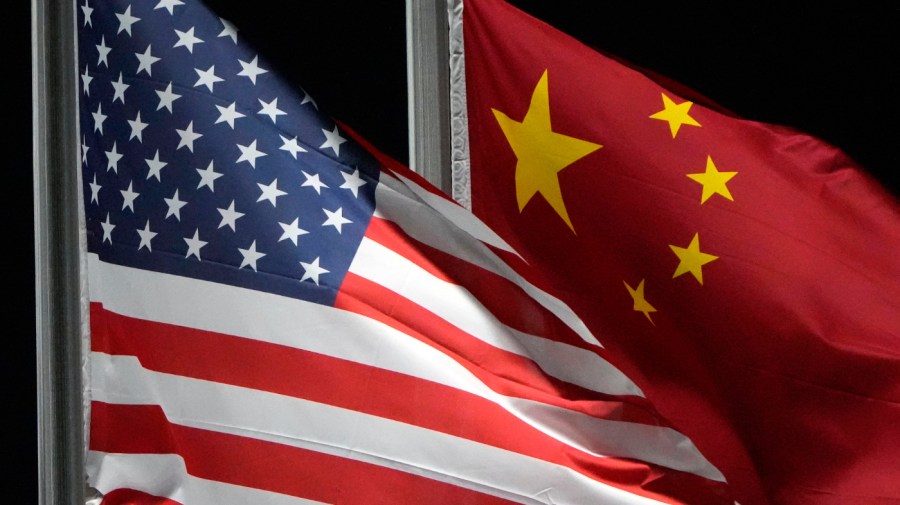
The Chinese Communist Party’s influence is alive and well in the U.S.
Political scandals have reignited concerns over Beijing’s overseas campaign. Examples include the charging of an unregistered Chinese state agent working as a top aide for New York Gov. Kathy Hochul (D) and foreign agents affiliated with a Chinese Communist Party-linked electrical vehicle battery company making contributions to Democratic campaigns.
Although it has been framed as such, this is not a recent issue either. In 2018, it came to light that the late Sen. Dianne Feinstein (D-Calif.) had employed an unidentified Chinese agent for nearly 20 years at her field office.
These Chinese agents and lobbyists have sought not only to promote China’s interests and repair its image abroad but have also aimed to censor topics that the Chinese Communist Party deems controversial, such as discussions about Taiwan’s sovereignty and the treatment of the Uyghurs, labeled by various governments and organizations as a genocide.
This exportation of censorship is clearly an attack on one of American democracy’s most prized tenets: the freedom of speech and expression.
Perhaps even more concerning are the alleged ties between the Chinese Communist Party and Minnesota Gov. and Vice Presidential nominee Tim Walz (D), detailed in a recent letter and subpoena by the House Oversight Committee.
He is running for the second-highest office in the federal government — one that closely advises the president and often acts as a representative of the country when meeting with foreign dignitaries. This comes after his false claims over his whereabouts during the 1989 Tiananmen Massacre and his sympathetic statements about Chinese communism .
The Chinese government continues to harass and repress dissidents, many of whom are U.S. citizens, and run espionage operations in their communities. Such operations may utilize Chinese police stations located in five states.
Beyond politics, the Chinese government’s influence is seeping into our educational system, from elementary schools to universities. It has contributed to and funded anti-Jewish fervor on college campuses, poses a risk to our critical defense infrastructure and is largely fueling the nation’s opioid and illegal marijuana production, which is intertwined with concerns over human and labor trafficking. And there is much more to this list.
The foreign policy that a given administration adopts will sway not only the actions of this authoritarian regime with respect to its own citizens but will also affect the extent to which such foreign infiltration succeeds on U.S. soil.
These instances of continued — and intensified — intrusion using psychological warfare, espionage, election interference and hard money show that the traditional distinction between foreign policy and domestic issues is outmoded. Foreign policy has immense potential to shape a country — socially, politically, fiscally and in terms of security.
Luckily, this election cycle, polling indicates that more American voters are paying attention to foreign policy than previously. About 4 in 10 voters now view foreign policy as a top concern, with registered Republicans expressing more interest in this issue than registered Democrats. The same poll reveals the current percentage of U.S. adults who want the government to focus on foreign policy is up from 18 percent in 2023.
This increase in attention to foreign policy comes at a time when inter-state wars have increased as well, and their fiscal implications are undeniable, as exemplified by the substantial spending on a seemingly unending war in Ukraine — funds that could be rediverted to local communities and disaster relief in the U.S. in the presence of decisive political leadership. This war is also contributing to inflation.
Despite its recent traction, foreign policy should continue gaining momentum among voters in subsequent elections — and must not be forgotten. It is an issue area that deserves consideration among bread-and-butter issues like taxation, education and drug addiction, as it can have a bearing on them.
Unmitigated Chinese Communist Party influence, however, also poses long-term dangers to our democracy. The Chinese party-state’s influence in the U.S. extends to political and non-political areas of life, affecting how safe people feel articulating their views and citizens’ trust in elections at all levels of government. Each of these corresponds to a different facet of American democracy — the freedom of speech and assembly and free and fair elections.
Foreign adversaries’ plans to incite political violence, such as through assassination plots, further degrade the fabric of our political system and contribute to societal upheaval.
On the other hand, efforts by media outlets and some elected officials to vilify domestic conservative groups as threats to democracy are unproductive and serve politically motivated purposes. Such incendiary rhetoric overlooks the oversized risk that China and other external actors, like Iran, pose to the health of U.S. democracy as well as to the immediate safety of the U.S. citizenry. China and like adversaries are also sure to reap benefits from this type of division.
If the public turns a blind eye to the Chinese government’s actions within our borders and to the broader implications of foreign policy on domestic security, who will pay attention? What will happen? The answer to the former question is uncertain while the response to the latter is slightly clearer: The situation is bound to worsen.
Erik Durneika is a graduate teaching assistant at the University of Pittsburgh’s Department of Political Science. He has done work for the Uyghur Human Rights Project and served as a distinguished visiting researcher at National Taiwan University’s Research and Educational Center for China Studies and Cross-Taiwan Strait Relations.

